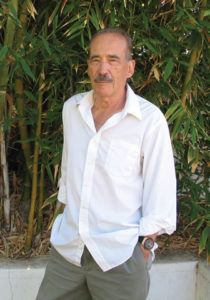 The Lost Manuscript: A Particular Silence
The Lost Manuscript: A Particular Silence
This spring I lost a manuscript. A hundred and fifty pages of handwritten text that I’d been working on for a year.
We’d suffered an upheaval of the home, a bedbug infestation. To get rid of these fiends, you must evict yourself from the rooms they have taken. Defeated as soon as you begin, you must vacuum, wash, bag, roast, poison or discard your belongings. Once you have removed all evidence of yourself, the exterminator sprays down a poison that must remain on your floor for months. The bugs don’t die easy. The poison must be set down in layers. It was not these actions alone, but the required repetition of these actions, that unhinged me.
I like to write in the morning, sitting in bed. The book I’d been working on, months of research and piles of handwritten text, was kept in a binder. I always write everything by hand first, but this time I was trying an added experiment of not entering any of it into the computer. I wanted to see how organic the structure might be if I didn’t interrupt the writing for typing.
Obviously, I kept this binder by the bed.
I think I believed that my binder would be immune. A book being created feels pristine, supernatural, imperishable. But when I opened my binder after cleaning out the bedroom, the first pages were full of blood. My blood. Also, black specks of feces. Those bugs drank my blood and then shat it out in the pages of my book.
In the hysteria that ensued, I vacuumed the pages on the back stoop, thrust them under the doormat in a vortex of ripping pages, wind, weeping. After, I heaped them into doubled plastic bags. There, memory fails.
A day or so later, I realized that I didn’t remember what I’d done with the manuscript. I remarked to my husband that it was somewhere in the sea of black trash bags we had surrounding our house, filling our shed, in the Bluebeard’s chamber of our closed-off bedroom. We fondled bags. We opened them. We looked. It wasn’t there.
We had been throwing away bags of stuff marked “bedbugs” for days. I am known for my memory, which is sometimes obscenely accurate. But I couldn’t remember anything after I’d vacuumed and bagged the thing. And if I couldn’t remember, then it was entirely possible that I’d done the unthinkable, that I had thrown it away, that it was in the landfill, baking alongside diapers and banana peels.
I had spent months researching historical Tucson. Free weekends, winter break, I spent hours in historical museums, on historical websites, in libraries. I read books on WWI, on Tucson history from 1860-1920. I wrote pages capturing the mirroring sorrows of war, epidemic, broken landscapes. I birthed a Paul, an Aggi, a family.
I mentioned the lost manuscript to friends, but my telling was impassionate, distant. Oh well, I’d say, I have lots of other books to write. The friends looked at me strangely. It must be in the shed, they’d say. Aren’t you upset, they’d ask? Are you okay? I shrugged. They told me of Maxine Hong Kinston’s fire, Hemingway’s stories lost on a train, Dylan Thomas’ misplaced manuscript (three times!), of Flaubert, burying his book in the face of oncoming war (never found). There’s internet sites listing lost manuscripts through the ages. None of this resonated with me. These lists of absences seemed strange. The truth was, the book was simply growing silent.
One day, my husband said something to me about the main character. “Paul, who?” I responded. He blanched and stared at me in genuine alarm.
As a practice, I often imagine the book I’m writing as I fall asleep, so that I can see the characters up close. When I tried this, on our squeaky airbeds in a room with blank walls and bugs in the outlets, it was as if I looked through the wrong end of a telescope. The figures were small, smaller, tiny. I couldn’t hear what they were saying or see them distinctly at all.
People asked: Would I rewrite? Would I write about the losing? Would I write something else? I gave vague answers. I decided I’d write it in some radical format: short, sharp bursts of text. I decided that I would never write it. I decided to write it without the research. In truth, the whole story had gone faint and muffled. There was nothing to be done about it. It was sinking away. But I didn’t want anyone to know that. It seemed like such a sad failure.
Bedbugs are a shadow plague, difficult to eradicate. They linger and drink and hide. Over a couple of months, our house was increasingly dissected and strewn. Our mattress and belongings roasted in the sun. We didn’t sleep well. We touched hands at night, across the poisoned floor, our hollow beds squealing. The loss of the book fell into the folds of the loss of our home, fell into the loss of our immunity.
When the bugs were finally gone, we moved our whole house around. The bedroom was a place where creatures had crawled across my face, thrust tubes into my skin, drank from my blood. There had been too many mornings where the lasting blooms of bites on my body pointed to our continued entrapment. I could not sleep there anymore. So we created a new house. Everything came off shelves, was cleaned, set up in new rooms.
In the great rearranging, I noticed that a shelf of older, handwritten manuscripts bulged noticeably. I pulled these binders out and found some thin poetry books jammed behind them. It was strange and nesty and behind all these books, there it was. Wrapped in plastic and fragile as an infant, the pages of my book. A ferocious sense of motherhood arose and I walked around the house, weeping and holding this baby to my heart.
Without meaning to, I buried it to protect it, as amulet, as saint, as bone. Unearthed to light, it came right back. Thoughts about the text streamed in as though there had been no hiatus, no terror, no muffling, no loss. The book re-entered my vocabulary.
I am altered, knowing that what is created, invented, and conceived in the mind can be silenced.
I get back to the writing nonetheless.
What he remembers jumbles, rolls, slides. He cannot keep it organized and understandable. He has returned, but some part of him is nowhere, is vanished, a hole. At the bar, they’d told him of their wheat-less, pork-less, beef-less, sweet-less days. He listened and nodded and had no reply. He wished he’d been there. He wished he’d stayed, folded bandages, melted tin, grown gardens. He would have himself, if he had stayed. Something to go on. What would make it different now? How would he fix things? The massive weight of all that Paul did not know rose before him.
Italicized text from the lost and found manuscript, titled, Are There Words for Everything?
 Today we are pleased to feature author John Milas as our Authors Talk series contributor. In this podcast, John discusses his short story “Tide Roll Away,” and emphasizes the theme of the “humanity of people who wear uniforms.”
Today we are pleased to feature author John Milas as our Authors Talk series contributor. In this podcast, John discusses his short story “Tide Roll Away,” and emphasizes the theme of the “humanity of people who wear uniforms.” On Wednesday June 14th at 7PM, Changing Hands Phoenix will be hosting Paul Brinkley-Rogers as he discusses his new memoir, Please Enjoy Your Happiness. The memoir focuses on his time in 1959 when he had a love affair with an older Japanese woman while serving aboard a US Navy vessel outside of Yokusaka. Paul is a Pulitzer Prize-winning journalist and veteran war correspondent that worked for many years in Asia, covering the war in Vietnam and Camboadia for Newsweek.
On Wednesday June 14th at 7PM, Changing Hands Phoenix will be hosting Paul Brinkley-Rogers as he discusses his new memoir, Please Enjoy Your Happiness. The memoir focuses on his time in 1959 when he had a love affair with an older Japanese woman while serving aboard a US Navy vessel outside of Yokusaka. Paul is a Pulitzer Prize-winning journalist and veteran war correspondent that worked for many years in Asia, covering the war in Vietnam and Camboadia for Newsweek.  The Lost Manuscript: A Particular Silence
The Lost Manuscript: A Particular Silence